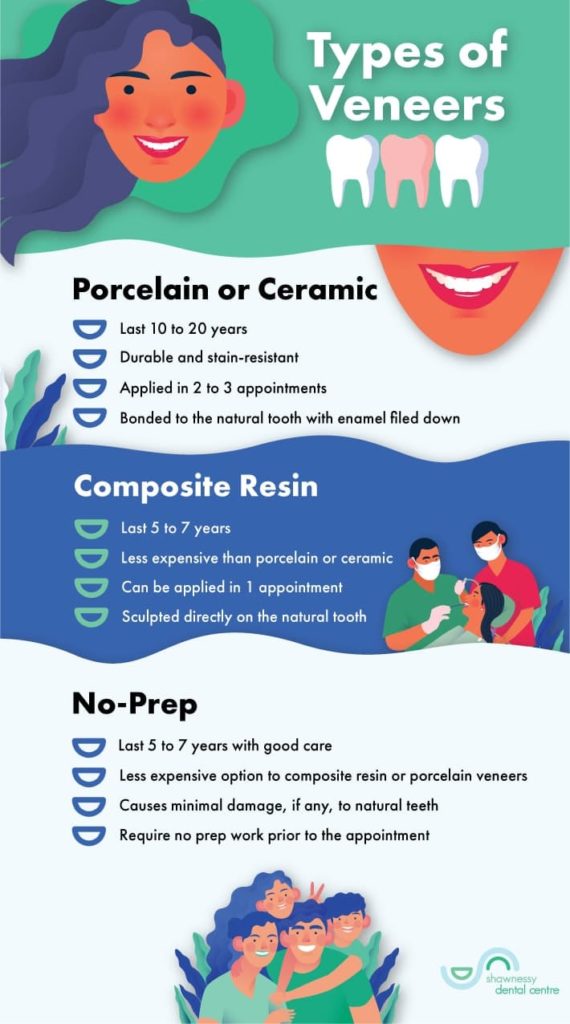Veneers are thin “shells” applied to the front of the teeth to give you the perfect smile you’ve always wanted. They’re primarily used to improve your teeth’ appearance and are a permanent way to fix unsightly problems with your smile, such as chipped, broken, discoloured, or smaller-than-average teeth. Each veneer is applied individually, so you can get one or as many as you’d like to create an even, symmetrical smile. If you’d like a smile makeover, veneers are a great way to do so.
Different Types of Veneers
Veneers are a great way to achieve your dream smile, especially if you’ve already tried other dental treatments, such as whitening or braces, and have not gotten the results you’d like. However, there are several different kinds of veneers, all with unique pros and cons. It’s best to discuss veneers with your dentist to ensure you have all the information you need to choose which type will be best for you.

Porcelain & Ceramic
Porcelain and ceramic veneers are very durable caps that fit on the tops and sides of your teeth. They match your teeth’ shape and colour and look incredibly natural, making them a good choice if you only want one or two veneers. They’re strong, stain-resistant, and can last between 10 and 20 years.
Applying porcelain or ceramic veneers is an irreversible procedure, as your dentist will need to file down some of the enamel on your natural teeth to fit them. You’ll have to visit your dentist’s office 2 or 3 times to complete the procedure, as they’ll need to be custom-made from impressions of your natural teeth.
While you’re waiting for them to be made, your dentist will fit you with temporary, removable veneers. Once your veneers are ready, you’ll take a look at them to confirm the colour, shape, and size are precisely what you want. Then, your dentist will bond them to your teeth using a light-sensitive resin.
Composite Veneers
Composite veneers are made from a less expensive material that easily matches your natural tooth colour. However, they are less durable than porcelain or ceramic veneers, meaning they may only last between 5 and 7 years. However, having them replaced may still be more cost-effective than porcelain or ceramic veneers because they are significantly less expensive.
Composite veneers do not require the tooth’s enamel to be filed down, and in some cases, your dentist may be able to make and place them in a single visit. If your composite needs to be lab-made, you may have to go through a similar process to getting porcelain or ceramic, but this mainly isn’t the case.
Typically, composite veneers are sculpted directly onto your teeth to build the veneer. Then, your dentist will apply a high-intensity light to cure and harden the composite, and the veneers are smoothed and polished.
No-Prep Veneers
No-prep veneers are applied using less prep work and a quicker process, making them an attractive option. They take much less time and effort to install and are still a great, long-lasting option to improve your smile. No-prep veneers can last between 5 and 7 years, especially if you take good care of them.
Instead of grinding off some of your natural teeth’ enamel, no-prep veneers can be applied directly to the natural tooth. This means they can be applied without anesthesia and minimal changes to your natural teeth. No-prep veneers are an excellent option for people with naturally healthy teeth, as research has shown they don’t put a lot of wear and tear on natural teeth.
To install them, your dentist will take an impression of your natural teeth and make the veneers from the impressions. They’ll then bond them directly to your natural teeth using a special resin or dental cement.
They, in theory, can be removed, as your natural teeth do not need to be altered to have them put on. However, your teeth may still be affected in some way by the procedure of installing or removing them.
Are Veneers Right for Me?
Veneers can be an excellent option for those interested in revamping their smile. However, they are considered a cosmetic treatment and may not be suitable if you have significant dental problems or oral diseases.
Generally, veneers are a good option for:
- Broken or chipped teeth
- Severe discoloration
- Gaps in the teeth
- Smaller-than-average teeth
- Pointed or unusually shaped teeth
If you’re interested in veneers and what they can do for your smile, talk to your dentist! Consulting a professional is the best way to determine if veneers are right for you.


